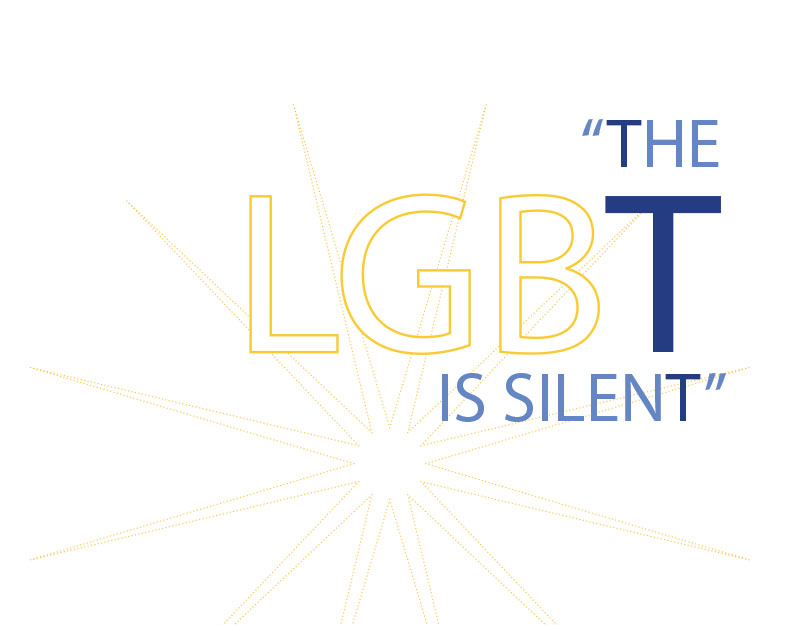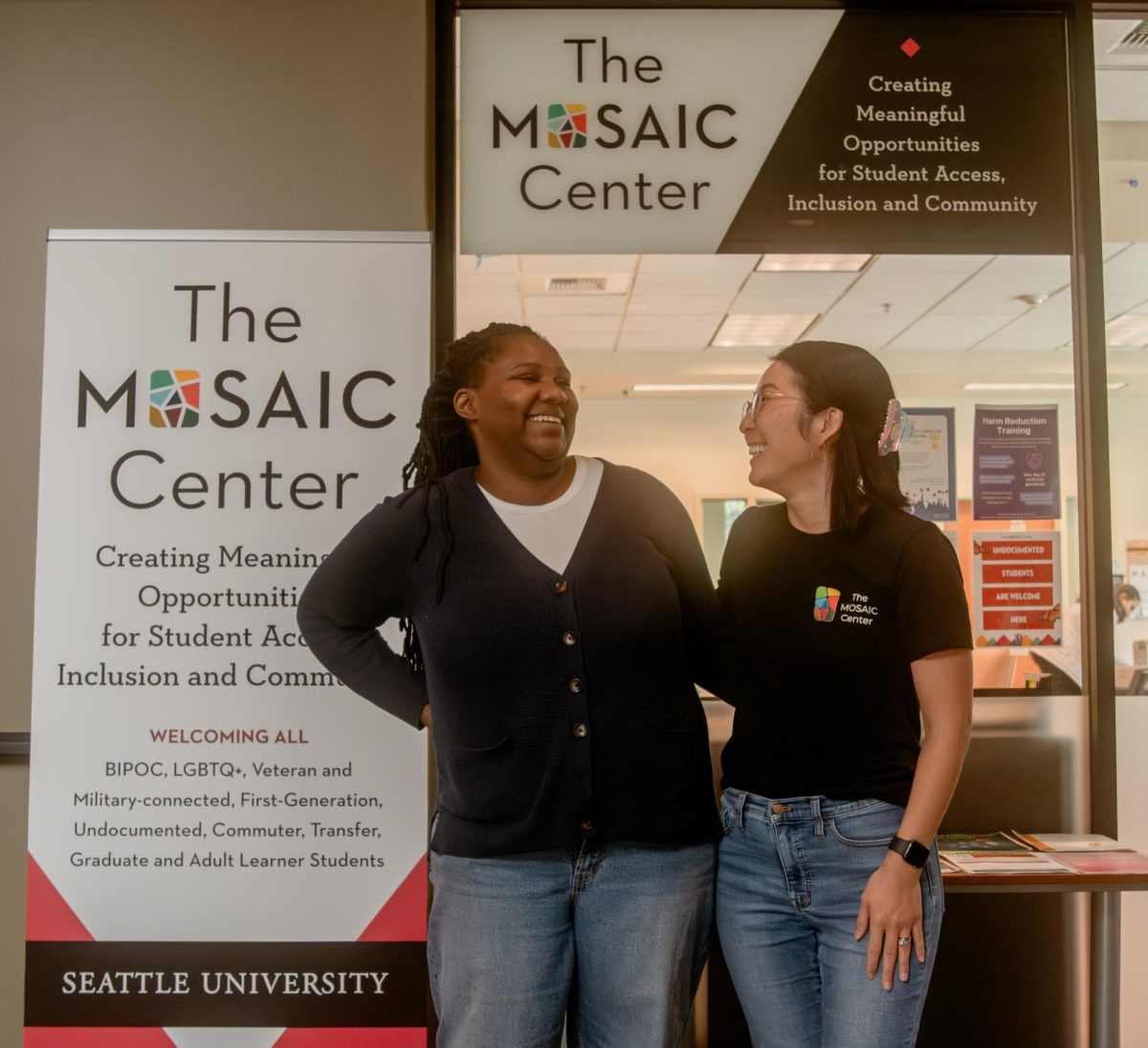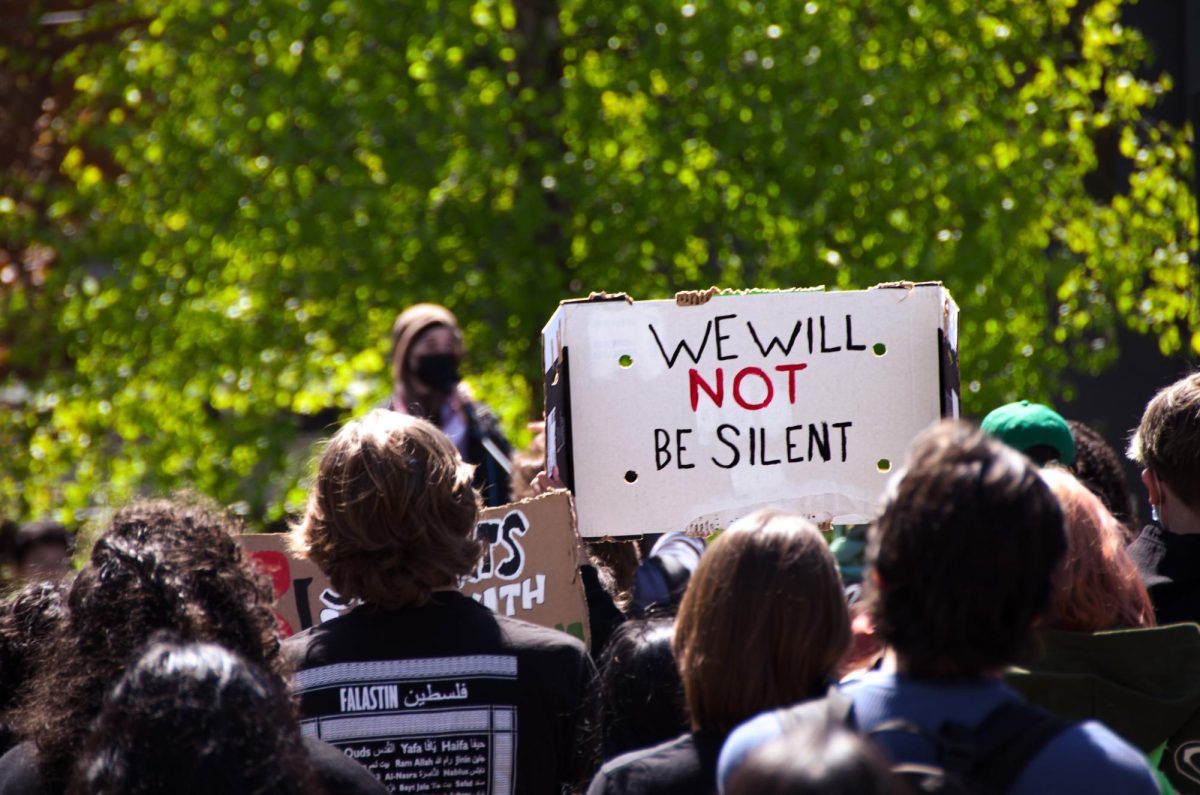
Haley Bayuga Graff has a black three-ring binder. It’s a heavy and hulking thing, stuffed with papers—a few slip out around the edges, some are tucked into the pockets, some are slipped in wherever Haley finds a place for them.
“I realized that people don’t really know what we’ve been doing,” they said, heaving the binder open to reveal page after page of important-looking documents. “I mean, I know what we’ve been doing, but that’s because I’ve been the one doing it.”
Inside the binder (and spread across a C-Street table, at that point) are all the relevant documents—policy memos, status reports, audits, a sketched draft or two of a flyer-to-be—for the work Bayuga Graff has been doing as a member of Seattle University’s Committee to Improve Trans* Inclusion (CITI). It’s work that Bayuga Graff is palpably eager to discuss.
Originally formed five years ago, CITI submitted their recommendations to improve gender inclusivity on campus to the administration in 2011. Suggestions ranged from revising university forms to use inclusive language, creating gender-inclusive restrooms in every building, and a housing process based on self-identified gender rather than sex. According to the Office of Multicultural Affairs (OMA) Interim Associate Director Sabina Neem, the report was generally positively received by the administration, but there was no clearly-defined next step and other items on the agenda eventually took precedence. Momentum stalled, and CITI’s report was put on the backburner for a while.
Last year the committee reconvened to develop strategies for implementation. SGSU successfully had the report released in its entirety on Seattle U’s website. Bayuga Graff, by then a committee member, started working with Neem on a guide for trans* students. This led to the creation of a trans* inclusion internship. Residence Housing Association created a gender-inclusive housing petition. A campuswide restroom audit took place over the summer. Change was in the air.
Hence the paperwork.
—————————————
CITI received so many qualified applicants for the trans* inclusion internship that they decided to divide the position into three parts. Junior environmental science major Polly Lentz and Student Development Administration grad students Dario Ogaz and Taylor Dukes were picked to fill the position. The three meet weekly to communicate with one another and exchange information and resources, and they will start attending CITI meetings soon.
Lentz will focus most of their attention on student outreach and education, including the trans* student guide.
“In the future, Seattle U could be looked at as a school for LGBTQ folks to come to because they know that it’s a safe place where they can be free to be themselves,” Lentz said.
Lentz is also planning a second trans* liberation workshop following last quarter’s successful event. They were pleasantly surprised at the number of cisgender [people whose gender identity aligns with their assigned sex at birth] people in attendance.
“I was pleasantly surprised at the number of straight cis people that were there [last quarter] and were really well versed on pronouns and the proper way to speak about these sorts of issues,” Lentz said. “I think the culture at Seattle U is conducive to the idea of being trans* inclusive, but we’re not quite there yet.”
Ogaz’s responsibilities include improving faculty education and classroom inclusivity. He hopes to create more space for students to self-identify their names and preferred pronouns, and lessen the number of microaggressions occurring in the classroom.
“It’s something that every department on campus could really be working on actively, because this institution was not created with this group of students in mind,” Ogaz said.
Some of Ogaz’s work would benefit from an update of Seattle U’s data collection system, which is both confusing and outdated. According to Neem, Chief Financial Officer Connie Kanter and President Fr. Stephen Sundborg, S.J. have expressed interest in investing resources in an update of the school’s data system, though the process could take a while.
Dukes is researching other institutions’ human resource guides to see how Seattle U compares and learn how we could improve.
“Most Jesuit institutions have in their discrimination clauses that you can’t be discriminated against for gender identity, which is pretty great progress. But I think only one institution currently covers medical transition on insurance, and it’s not us,” Dukes said.
Many institutions’ HR guides focus on transition, and Neem hopes that Seattle U’s can be friendlier to gender-nonconforming faculty, staff, and students.
“I have faith in Seattle University, with its ideals, that it can meet the expectations that the community is setting for it,” Dukes said. “We are part of the university working towards bettering the university. We are not an outside force.”
—————————————
Incidentally, the year since CITI reconvened has not only brought progress at Seattle U—it also brought increased visibility for trans* people in pop culture. Actress Laverne Cox soared to national prominence on the hit Netflix show “Orange is the New Black,” model Carmen Carrera inspired a campaign for Victoria’s Secret to hire her as their first transgender Angel, and activist and author Janet Mock published her first novel “Redefining Realness.” Carrera and Cox’s January interview with Katie Couric, in which both women were asked invasive questions about their genitalia, sparked a national dialogue about the media’s ignorant treatment of transgender people. Mock’s appearance on Piers Morgan Live a month later only intensified the discussion. During the interview, Morgan placed undue attention on Mock’s transition instead of her advocacy work, and repeatedly said she had “been a man” until her surgery.
“The preoccupation with transition and surgery objectifies trans* people,” Cox said in her interview with Couric. “And then we don’t get to really deal with the real lived experiences. The reality of trans* people’s lives is that so often we are targets of violence. We experience discrimination disproportionately to the rest of the community.”
—————————————
The way the media tell it, marriage equality is the foremost challenge that faces the LGBT community. Accordingly, the nice couple that just wants to be able to get married like everyone else has become the most visible face of the movement.
“The way that marriage equality campaigns have worked is to articulate that queer people are ‘just like everybody else,’” Neem said.
According to Neem, this may be one reason why awareness and acceptance of the trans* community has been sluggish. The gay-couple-next-door has been a Trojan horse of sorts to incite non-threatening change, but that has led to the erasure of those most in need of support—those who don’t fit quite as neatly into this narrative.
“I think it’s part of a larger gay rights movement that has always prioritized the needs of the least disenfranchised,” Neem said.
Dukes also noted the power structures that exist within what she calls the “LG” community.
“As a white cisgender queer person, I have to be aware of the privileges I hold,” Dukes said. “I see a lot of these privileges playing out in the community, especially on national levels.”
For example, Human Rights Campaign is the largest LGBT civil rights organization in the country. (You may be familiar with their logo because it’s stuck to the front of approximately every single MacBook Air on the planet.) Their treatment of the trans* community has always been controversial. Back in the ‘70s, HRC notoriously removed a section of a New York civil rights bill that would have protected trans* people in an attempt to improve the bill’s chance of passing in the state legislature (it didn’t). Their track record has been checkered at best ever since, from their support of a 2007 non-discrimination bill that omitted protections for gender discrimination, to their censorship of a trans* pride flag at a 2013 marriage equality event.
To their credit, HRC’s website provides resources for transgender people, and many trans* people and genuine allies volunteer with the organization. It’s not all bad. The problem, as Neem and Dukes mentioned, lies in the power structures that allow those with relative privilege to continue to call the shots—even within activist circles like the HRC.
—————————————
Junior film studies major Sabel Roizen’s attitude toward their experience as a nonbinary person comes across as equal parts caustic and nonchalant.
“I am blessed with a large capacity for apathy,” they said.
Roizen, who is the facilitator of Gender Galaxy and the social media specialist for Student Events and Activities Council, doesn’t identify as male or female and is not a fan of the trans* label. (Though it’s often used as an umbrella term, not every nonbinary person identifies as trans*).
“It generally implies that you’re going from one gender to another,” Roizen explained. “Like there’s an end goal that’s established. Like ‘we’re transitioning away from using VCR players in the classroom.’”
Roizen’s presentation is self-described as “fairly conventionally masculine.” They shop in the men’s section without exception, and are used to having their preferred pronouns ignored in favor of he/him pronouns. Most of the time, the slip-ups don’t bother them.
“A lot of people don’t know about my history and use he pronouns and don’t even think twice about it,” Roizen said.
Roizen decided to start altering their gender expression before talking to their friends and acquaintances about it, trusting that they would eventually start using other pronouns of their own accord—and they did.
“I wish I were a bit more of a champion about making people think about gender in a critical fashion,” Roizen said. “But for the sake of time and sanity and the ease of social interaction I usually just let it slide.”
The expectation placed on gender nonconforming students to patiently educate their peers and professors when they’re misgendered can be a heavy burden—one that Bayuga Graff has also felt.
“If I correct someone on my pronouns, I’ll never be a jerk about it. Why would I be? If someone says ‘she,’ I’ll just be like, ‘I prefer ‘they.’ But then people go ‘oh God, you’re so PC, oh God, another gender thing,’” Bayuga Graff said. “Is it my job to educate this person about this?”
—————————————
That said, the student body will require some serious education to keep up with policy changes.
A recent state of the student survey included a question about gender-inclusive restrooms. The question was poorly worded and eventually thrown out, but Lentz and Bayuga Graff were both given access to the responses—which showed just how far the student body still has to go.
“A lot of the responses were like ‘this is not an issue, no one faces this issue.’ It was hard to read,” Lentz said. “If people knew that there are students who need inclusive bathrooms—it could even be one of your friends—that would change a lot of people’s minds.”
“A lot of people call it a non-issue on campus, which is where education is really needed,” Bayuga Graff said. “I’m standing right in front of you, saying, ‘Hi! This affects me!’”
“Students should not have to plan their day around bathroom use or sit in class distracted due to anxiety around bathrooms,” said an anonymous recent alum. “The SGSU elections are happening right now and all the candidates seem at least aware of the bathroom push, so that’s a start, I guess,” Lentz said.
—————————————
Junior Humanities for Teaching major Eric Sype has a rural wholesomeness about him, from his courteous demeanor to his well-worn flannel shirt. Sure enough, he was born and raised near the Cascade foothills in tiny Cashmere, Wash., and he left this small town with a set of small-town values to match: when he came to Seattle U, he was still politely but insistently against marriage equality.
But after a number of conversations with his new peers, Sype’s change of heart came quickly. By the time R-74 was passed in 2012, he was the overjoyed first dancer who started the now-legendary 10th Avenue and Pike Street celebration.
Sype’s story has a near-cinematic kismet about it—he’s a best-case-scenario example of the shift in attitudes that could take place among small-towners just like himself over the next 10 years.
“I realized there was something going on with these issues that I don’t understand, but I need to try to understand it,” Sype said. “I’m a white straight male who is very secure in my gender identity. That privilege doesn’t necessarily allow me to understand these issues on my own. So it’s something I need to seek out.”
At the time of his interview he was still campaigning, but Sype has since been named SGSU president elect. Following in the footsteps of his predecessor Eric Chalmers (who serves on CITI and took part in the campuswide restroom audit last summer), gender-inclusive restrooms were part of Sype’s campaign platform. Sype’s stance lost him a few votes, though the positive feedback far outweighed the negative.
—————————————
According to Neem, the campus could see more gender inclusive restrooms with better signage by autumn. Of course, a change in campus culture will take a lot more than switching up some restroom placards, but Neem remains hopeful.
“I don’t think the committee would exist if people didn’t think that things could be changed or that there was a conducive environment for change,” Neem said.
—————————————
Bayuga Graff first fully realized the need for change while giving a campus tour during their sophomore year. A prospective freshman had expressed interest in gender-inclusive housing, but after some research learned that the Murphy Apartments would be his only option.
“It was not stated, but it was sort of agreed between us that that cancelled out any chance he had of having the freshman residence hall experience,” Bayuga Graff said. “He didn’t end up coming here because it wasn’t an option.”
At the time of our interview, Bayuga Graff, a third-year resident advisor, was in the process of editing RHA’s transgender housing proposal, which will eventually be brought forward to SGSU as a resolution. If it passes, it will go to the cabinet. If it passes there, they will work with housing to create a more concrete plan.
“I didn’t realize the extent to which there’s so much red tape for stuff. Everything’s a process,” Bayuga Graff said.
The binder on the table, filled with CITI paperwork, is their exhibit A. But hard work pays off and their hope that no prospective students will be deterred by a lack of resources could soon be realized.
“This may not be a huge portion of the student body,” said Chalmers in what could be one of his last interviews as SGSU president before he passes the torch to Sype. “But it would only take one person to convince me that this work is worthwhile.”
Caroline may be reached at
[email protected]












